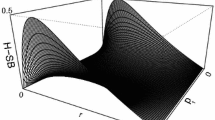Abstract
We make theoretical comparisons among five coefficients—Cronbach’s α, Revelle’s β, McDonald’s ω h , and two alternative conceptualizations of reliability. Though many end users and psychometricians alike may not distinguish among these five coefficients, we demonstrate formally their nonequivalence. Specifically, whereas there are conditions under which α, β, and ω h are equivalent to each other and to one of the two conceptualizations of reliability considered here, we show that equality with this conceptualization of reliability and between α and ω h holds only under a highly restrictive set of conditions and that the conditions under which β equals ω h are only somewhat more general. The nonequivalence of α, β, and ω h suggests that important information about the psychometric properties of a scale may be missing when scale developers and users only report α as is almost always the case
Similar content being viewed by others
References
Blalock H. M. (1970) Estimating measurement error using multiple indicators and several points in time. American Sociological Review, 35:101–111
Bollen K. (1989) Structural Equations With Latent Variables. New York: Wiley Sons
Bollen K., Lennox R. (1991) Conventional wisdom on measurement: A structural equation perspective. Psychological Bulletin, 110:305–314
Cronbach L. J. (1951) Coefficient alpha and the internal structure of tests. Psychometrika, 16:297–334
Green S. B., Hershberger S. L. (2000) Correlated errors in true score models and their effect on coefficient alpha. Structural Equation Modeling, 7:251–270
Green S. B., Lissitz R. W., Mulaik S. A. (1977) Limitations of coefficient alpha as an index of test unidimensionality. Educational and Psychological Measurement, 37:827–838
Heise D. R. (1969) Separating reliability and stability in test-retest correlation. American Sociological Review, 34:93–101
Joreskog K. G. (1974) Analyzing psychological data by structural analysis of covariance matrices. In R. C. Atkinson, D. H. Krantz, R. D. Luce, P. Suppes (Eds), Contemporary Developments in Mathematical Psychology (pp. 1–56) San Francisco: Freeman
Komaroff E. (1997) Effect of simultaneous violations of essential tau—equvalence and uncorrelated error on coefficient alpha. Applied Psychological Measurement, 21:337–348
Lord F. M. (1955) Sampling fluctuations resulting from the sampling of test items. Psychometrika, 20:1–22
Lord F. M., Novick M. R. (1968) Statistical Theories of Mental Test Scores (with contributions by A. Birnbaum) Reading, MA: Addison-Wesley
McDonald R. P. (1970) The theoretical foundations of principal factor analysis, canonical factor analysis and alpha factor analysis. British Journal of Mathematical Psychology, 23:1–21
McDonald R. P. (1978) Generalizability in factorable domains: “Domain validity and generalizability.” Educational and Psychological Measurement, 38:75–79
McDonald R. P. (1985) Factor Analysis and Related Methods. Hillsdale, NJ: Erlbaum
McDonald R. P. (1999) Test Theory: A Unified Treatment. Mahwah, NJ: Erlbaum
Novick, M. R., Lewis C. (1967) Coefficient alpha and the reliability of composite measurements. Psychometrika, 32:1–13
Raykov T. (1997) Scale reliability, Cronbach’s coefficient alpha, and violations of essential tau-equivalence with fixed congeneric components. Multivariate Behavioral Research, 32:329–353
Raykov T. (1998a) Coefficient alpha and composite reliability with interrelated nonhomogeneous items. Applied Psychological Measurement, 22:375–385
Raykov T. (1998b) A method for obtaining standard errors and confidence intervals of composite reliability for congeneric items. Applied Psychological Measurement, 22:369–374
Raykov T. (2001a) Bias of coefficient alpha for fixed congeneric measures with correlated errors. Applied Psychological Measurement, 25:69–76
Raykov T. (2001b) Estimation of congeneric scale reliability using covariance structure analysis with nonlinear constraints. British Journal of Mathematical and Statistical Psychology, 54:315–323
Raykov T. (2002) Analytic estimation of standard error and confidence interval for scale reliability. Multivariate Behavioral Research, 37:89–103
Raykov T., Shrout P. E. (2002) Reliability of scales with general structure: Point and interval estimation using a structured equation modeling approach. Structural Equation Modeling, 9:195–212
Revelle W. (1979) Hierarchical cluster analysis and the internal structure of tests. Multivariate Behavioral Research, 14:57–74
Schmid J., Leiman J. M. (1957) The development of hierarchical factor solutions. Psychometrika, 22:53–62
Wiley D. E., Wiley J. A. (1970) The estimation of measurement error in panel data. American Sociological Review, 35:112–117
Tucker L. (1940) The role of correlated factors in factor analysis. Psychometrika, 5:141–152
Wherry R. J. (1959) Hierarchical factor solutions without rotation. Psychometrika, 24:45–51
Author information
Authors and Affiliations
Corresponding author
Additional information
Preparation of this article was supported by the Patricia M Nielsen Research Chair of the Family Institute at Northwestern University
We thank Lewis R. Goldberg, Win Hill, Dan McAdams, Tony Z. Tang and especially Roderick P. McDonald for their comments on earlier drafts of portions of this article
Rights and permissions
About this article
Cite this article
Zinbarg, R.E., Revelle, W., Yovel, I. et al. Cronbach’s α, Revelle’s β, and Mcdonald’s ω H : their relations with each other and two alternative conceptualizations of reliability. Psychometrika 70, 123–133 (2005). https://doi.org/10.1007/s11336-003-0974-7
Published:
Issue Date:
DOI: https://doi.org/10.1007/s11336-003-0974-7




